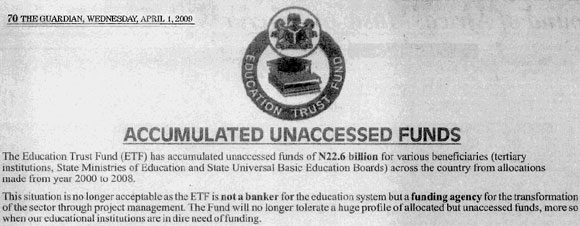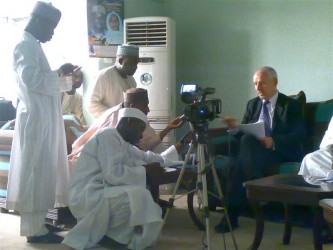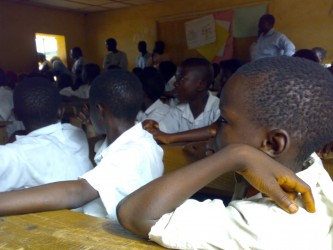In time honoured fashion I managed to trick my kids to run out to see an imaginary friend on April Fools' morning - although I suspect when they get older I'll be on the receiving end. Skimming the Nigerian press, with its usual colourful stories of corruption and extremes - the man with over 80 wives for example, I came across the following notice: I wasn't really sure if this was an April Fools' trick, a novel '419 scam' or the truth?

Checking online and seeing that the Federal Education Minister, Dr Sam Egwe had highlighted this very issue, verified the story is no April Fools' trick. It's encouraging that reforms to the education system are now very much on the agenda, within the Minister's first 100 days in office a Road Map has been compiled and there's a palpable will to tackle some of the hard issues - like better use of Nigeria's wealth.
The Education Trust Fund collects on a percentage basis a share of corporate profits and ploughs them back into universities, colleges and schools (through the State Governments). The notice above goes on further to name and shame the worst offenders and announces a 'use it or lose it' ultimatum. A university for oil resources has over £2 million (N 552m) unspent and 21 States each have over £1million (N 200m) unspent for the Board that manages primary schools (SUBEB). A likely major factor in the 'under spend' is the inability to account for proper use of earlier funding provided.
The problem was less severe in the Northern States that I often engage with, but many are on the list and it will be interesting to challenge State education leaders on why so much money is unspent when so many of the school and college facilities are in such appalling condition.

Recently in Jigawa State, one of the poorest in the Nigerian federation, DFID and the State Governor formally launched our new suite of programmes that collectively aim to improve governance and get better use of Nigeria's resources to impact on poverty. DFID Nigeria's Head Eamon, here seen 'facing the press', got repeatedly questioned on how much money the UK government will provide to the State.
The more interesting question is how much money from Nigeria's oil wealth does the State receive and how well is it used. Luckily Jigawa has a reform minded administration in place and has cleared most of its backlog of unspent funds, such as the Education Trust Fund (ETF) example quoted above.
DFID's total annual spend in Nigeria is around £100m (~N 21 billion), which is less than the unspent ETF funds highlighted above, which in turn is dwarfed by another even larger money pot: the Universal Basic Education Intervention Fund. This has even more unspent money, all allocated for Nigeria's basic schools, but that's a story for another posting!
DFID's new education programme, ESSPIN that was co-launched in Jigawa last month, will be engaging on these problems, helping both the Federal and State Governments to improve the processes and incentives that channel money and resources to the local level, where they can really make a difference on ordinary peoples' standard of living.
Good quality schooling and children learning isn't all about money, but getting the right 'package' of resources certainly helps.

For example in one large urban primary school I recently visited there were 66 teachers on the State payroll, but only 12 classrooms and a desperate need for a secure boundary to improve security and to have a source of water for the school.
Little learning was going on, as 100 children sat quietly in class doing nothing while 4 teachers sat at the front, filling in report cards.
Even if the central funds can be made to flow and be used effectively, there's a remaining challenge to spend wisely and change approaches to learning and school management that engage with the local community. The notion that schooling is all about a set of large annual construction packages in the State budget has to be dispelled!

2 comments
Comment by sade fadipe posted on
I sat gubsmacked in the audience of the international conference hall in Abuja, as the minister for education Dr. Sam Egwu named the culprits who had failed to access ET funds due thier universities.
Two thoughts came to mind:
Firstly how cumberxome could the procedures that kept them from claiming the monies have been? and for what purpose? could there be other motives involved?
Secondly, those that did claim their funds - what had they done with it? Do their institutions stand out from the rest?
Just recently as read in the papers - funds for health and education would be diverted towards constructing a 10-lane road leading from the airport into the capital city; as the projected funds could not be exhausted before the end of the financial year.... Could this be a sign that the FCT has over sufficient monies to solve all the educational issues and that the N6. something billion is a left over after all achievements?
What is worth doing at all is worth doing well. I appreciate DFID's efforts in Nigeria. And i am sure that it is aware that operating at the grassroots has yielded all the success stories to far.
Having taught in the UK for 13 years i know how delapidated the school systems is. But as teachers, headteachers and managers that have no concept of how the world has moved on, we continue to struggle with getting them to visualise the Big Picture and the full implementation of the Children's Right Act.
My many visits to public schools has made me warm-up in appreciaation to the personnel that manage them, if only they knew better... if only they were given the right resources... If only the learning environment were conducive... If only.
It is not HOW MUCH money is spent/available but how WELL it is used.
Sade Fadipe
Education consultant
Abuja, Nigeria
Comment by Musa M.Hadejia posted on
Dear SAde,
The multiple problems of education in Nigeria is a chronic phnomena especilly in the remote rural areas of the north.
Thus the need to articulate effective demand for better educational services is critical. Again, the political will in government must be seriously re-visited and mass public awareness created.
Further to this, Civil Society groups have to have their capacity built and effectively de-politicised towards achieving greatr synergies with relevant key stake holders. EFCC and ICPC to be more alert, up and doing.
Tied to this, there must be proper institutional and electoral reforms that would galvanise teachers, SBMCs and parents in to positive and constructive engagements.
Musa M. Hadejia
A&E, ESSPIN, JIGAWA